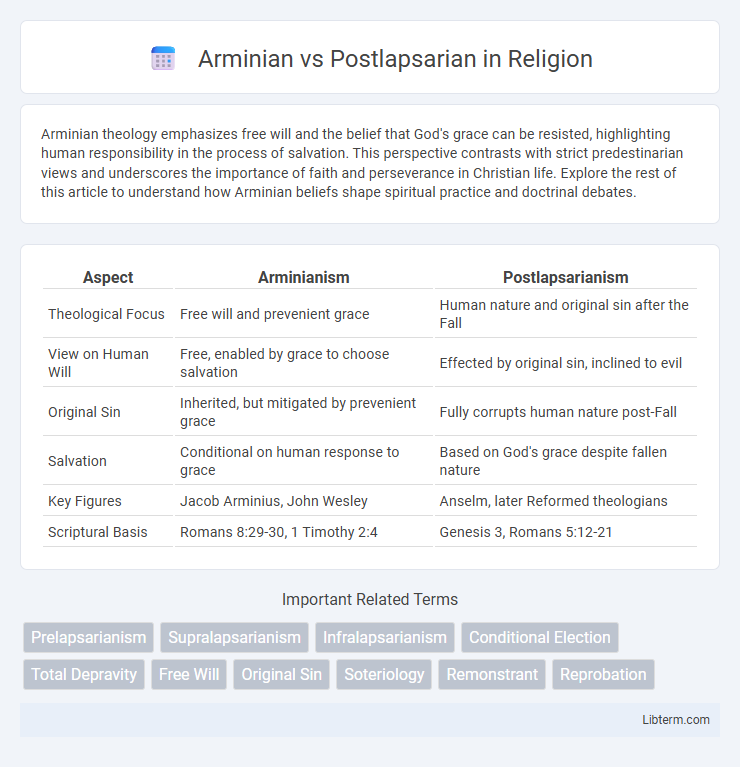Arminian theology emphasizes free will and the belief that God's grace can be resisted, highlighting human responsibility in the process of salvation. This perspective contrasts with strict predestinarian views and underscores the importance of faith and perseverance in Christian life. Explore the rest of this article to understand how Arminian beliefs shape spiritual practice and doctrinal debates.
Table of Comparison
| Aspect | Arminianism | Postlapsarianism |
|---|---|---|
| Theological Focus | Free will and prevenient grace | Human nature and original sin after the Fall |
| View on Human Will | Free, enabled by grace to choose salvation | Effected by original sin, inclined to evil |
| Original Sin | Inherited, but mitigated by prevenient grace | Fully corrupts human nature post-Fall |
| Salvation | Conditional on human response to grace | Based on God's grace despite fallen nature |
| Key Figures | Jacob Arminius, John Wesley | Anselm, later Reformed theologians |
| Scriptural Basis | Romans 8:29-30, 1 Timothy 2:4 | Genesis 3, Romans 5:12-21 |
Understanding Arminianism: Core Beliefs
Arminianism emphasizes conditional election based on foreseen faith, affirming human free will and resistible grace, contrasting with the Postlapsarian view, which deals primarily with humanity's fallen state after the original sin. Central tenets include prevenient grace enabling all to respond to the gospel, and the possibility of falling from grace, highlighting God's universal salvific will. Understanding Arminianism requires recognizing its focus on human responsibility and God's prevenient grace as key factors in salvation.
Defining Postlapsarianism: Key Concepts
Postlapsarianism refers to the theological position that humanity's fall into sin occurred after the original creation, emphasizing a world marked by moral and spiritual decay. It contrasts with the prelapsarian view by locating human nature and divine justice within the context of post-fall conditions, highlighting the broken relationship between God and humans. This doctrine significantly shapes Arminian theology by framing human free will and grace in the aftermath of Adam and Eve's disobedience.
Historical Origins of Arminianism
Arminianism originated in the early 17th century as a theological response to Calvinist doctrine, primarily articulated by Dutch theologian Jacobus Arminius (1560-1609). It emphasized human free will and conditional election, contrasting with the predestinarian views of Postlapsarian Calvinism, which focused on God's sovereignty after the Fall of Man. The Synod of Dort (1618-1619) formally rejected Arminian positions, cementing the historical divide between Arminianism and Postlapsarian interpretations of salvation and grace.
Theological Roots of Postlapsarianism
Postlapsarianism originates from theological interpretations emphasizing humanity's fallen state after the original sin, predicated on a literal reading of Genesis 3. This doctrine contrasts with Arminianism, which centers on free will and prevenient grace, by affirming that human nature is inherently corrupted and incapable of choosing God without divine intervention following the Fall. Postlapsarian theology deeply influences doctrines of original sin, predestination, and atonement, framing salvation as a redemptive response to human depravity rather than a neutral or unfallen human condition.
Free Will in Arminian and Postlapsarian Thought
Arminian theology emphasizes the concept of free will, asserting that human beings possess the genuine ability to choose salvation or reject it, even after the Fall, highlighting a conditional election based on foreseen faith. Postlapsarian thought, on the other hand, views human will as inherently bound and corrupted by original sin, significantly limiting free will and necessitating divine grace for any movement toward salvation. This distinction underscores Arminianism's optimistic view of human agency contrasted with the more deterministic implications found in Postlapsarian interpretations.
Views on Original Sin: Arminian vs Postlapsarian
Arminian theology views original sin as an inherited corruption and depravity that affects all humanity, emphasizing prevenient grace as the divine enablement to respond to salvation despite this inherent sinfulness. Postlapsarian perspectives affirm that humanity's fallen state results from the original sin of Adam and Eve, causing a total depravity that necessitates divine intervention for redemption. Both views recognize the impact of original sin but differ in the extent of human inability and the operation of grace in restoring the sinner.
Salvation and Predestination: Diverging Perspectives
Arminian theology emphasizes conditional election based on God's foreknowledge of human free will, advocating that salvation is available to all but contingent upon individual acceptance of grace. Postlapsarian perspectives, rooted in a Fallen humanity after the original sin, interpret predestination as God's sovereign choice in the context of human sinfulness and the necessity of Christ's redemptive work. These divergent views shape foundational doctrines on human responsibility, divine sovereignty, and the nature of salvation within Christian theological discourse.
Influence on Modern Christian Doctrine
Arminianism, emphasizing free will and conditional election, significantly shapes contemporary Christian doctrines on grace, human responsibility, and salvation assurance, contrasting with Postlapsarian views that focus on humanity's fallen nature and total depravity. Modern theological debates regarding predestination, sanctification, and atonement often reflect the tension between Arminian conditionality and Postlapsarian fatalism. This dichotomy influences denominational teachings, worship practices, and pastoral counseling across Protestant traditions worldwide.
Notable Proponents and Critics
Notable proponents of Arminianism include Jacobus Arminius and John Wesley, who emphasized conditional election and free will in salvation. Key critics such as Calvinists uphold the Postlapsarian view, defending the doctrine of total depravity and unconditional election after the fall of man. The theological debate continues to influence doctrines on human nature, divine sovereignty, and grace within Protestantism.
Contemporary Debates and Implications
Contemporary debates between Arminian and Postlapsarian perspectives center on human free will, divine election, and the nature of original sin's impact on human ability. Arminians emphasize prevenient grace enabling humans to accept salvation, contrasting with Postlapsarian views that often stress total depravity post-fall, limiting human capacity without divine intervention. These theological distinctions influence modern discussions on soteriology, ecclesiology, and moral responsibility within various Christian traditions.
Arminian Infographic

 libterm.com
libterm.com